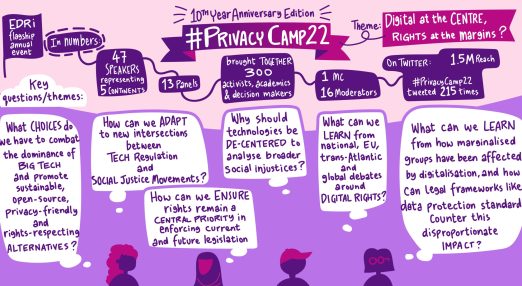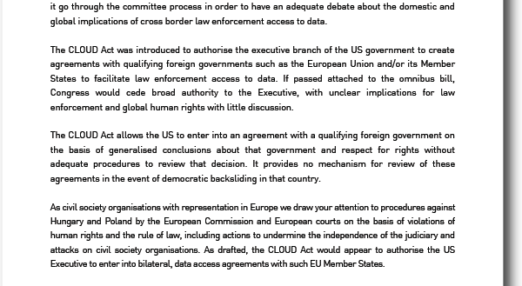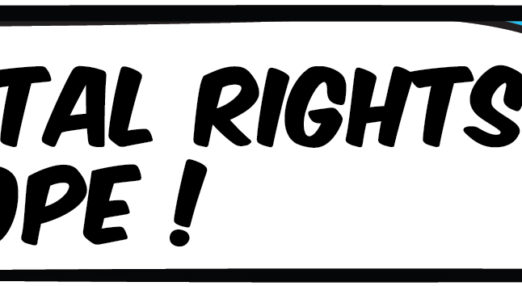microsoft
Filter by...
-

Foreign authorities are banning Google and Microsoft services from schools, the Czech Republic is floundering
Jan Cibulka, a journalist for iROZHLAS and member of the Big Brother Awards CZ Jury, organised by EDRi member Iuridicum Remedium, has investigated how Czech authorities and schools are approaching the protection of privacy when using distance learning tools. Such tools send sensitive information overseas, where US law gives intelligence agencies access to it. The tools do not guarantee that children's private chats will not be accessed by, for example, teachers. While the first regional governments in Europe are developing safer alternatives, in the Czech Republic the risk assessment remains up to individual schools. In practice, they have little choice.
Read more
-

WFH – Watched from Home: Office 365 and workplace surveillance creep
In the past few years, the pandemic and the shift to working from home have bolstered the use of remote surveillance software to monitor employees. In 2020, global demand for employee monitoring software increased 108 per cent by April and 70 per cent by May 2020 compared to pre-pandemic times. At the same time, search engine queries for "How to monitor employees working from home" increased by 1,705 per cent in April and 652 per cent in May 2020 compared to the previous year.
Read more
-

#PrivacyCamp22: Event Summary
The theme of the 10th-anniversary edition of Privacy Camp was "Digital at the centre, rights at the margins" and included thirteen sessions on a variety of topics. The event was attended by 300 people. If you missed the event or want a reminder of what happened in a session, find the session summaries and video recordings below.
Read more
-

Microsoft Office 365 banned from German schools over privacy concerns
In a bombshell decision, the Data Protection Authority (DPA) of the German Land of Hesse has ruled that schools are banned from using Microsoft’s cloud office product “Office 365”. According to the decision, the platform’s standard settings expose personal information about school pupils and teachers “to possible access by US officials” and are thus incompatible […]
Read more
-

CLOUD Act: Civil society urges US Congress to consider global implications
On 19 March 2018, European Digital Rights (EDRi) co-signed a letter with three other civil society organisations, asking the US Congress to ensure that the “Clarifying Lawful Overseas Use of Data Act” (the US “CLOUD Act”) is not attached to the omnibus bill. If the CLOUD Act is attached to the omnibus bill, it would […]
Read more
-

RightsCon session on cross-border access to e-evidence – key interventions
European Digital Rights organised a session at the RightsCon conference in Brussels on 31 March 2017, in order to build awareness among stakeholders about the multiple international developments on law enforcement access to electronic evidence. The bulk of the discussions focussed on a possible new protocol to the Cybercrime (Budapest) Convention of the Council of […]
Read more
-
Commission responds to Ombudsman investigation on EU Internet Forum
In April 2016, the European Ombudsman launched an investigation into the European Commission’s failure to disclose information of the “EU Internet Forum”. The EU Internet Forum brings together US internet companies (Microsoft, Facebook, Twitter, Google), government officials, and law enforcement agencies to discuss how to reduce the accessibility of undefined “terrorist material” and badly defined […]
Read more
-

Three steps to end freedom of expression
Our right to freedom of expression is laid out in law by the EU Treaties. To ensure democracy and accountability, this fundamental human right may not be restricted unless it is necessary, achieves an objective of general interest and the measure to restrict it is provided for by law.
Read more
-

Guide to the Code of Conduct on Hate Speech
On 31 May, the European Commission, together with Facebook, YouTube (Google), Twitter and Microsoft, agreed a “code of conduct” (pdf) on fighting hate speech. We believe that the code of conduct will damage enforcement of laws on hate speech, and undermine citizens’ fundamental rights. In a joint press release, EDRi and Access Now have therefore […]
Read more
-

Microsoft’s new small print – how your personal data is (ab)used
Microsoft has renewed its Privacy Policy and Service Agreement. The new services agreement goes into effect on 1 August 2015, only a couple of days after the launch of the Windows 10 operating system on 29 July. The new “privacy dashboard” is presented to give the users a possibility to control their data related to […]
Read more
-

Finnish BB Awards to Commissioner Paatero, Police Board and Microsoft
On 31 January, EDRi-member Electronic Frontier Finland (Effi) presented the Finnish Big Brother Awards 2015. The Awards are based on a concept created by Privacy International in the UK. The tradition started in 1998 in London, and the awards are given in about a dozen countries annually. The goal is to draw attention to violations […]
Read more
-

FTDI: Is the law criminal?
The EDRi-gram has previously reported on the general silliness, if not active harmfulness to an open society, of certain copying controls that are generically referred to as Digital Rights Management (DRM). However, it’s not often that a practical example comes around that underlines the problem and at the same time has potential to demonstrate the […]
Read more
